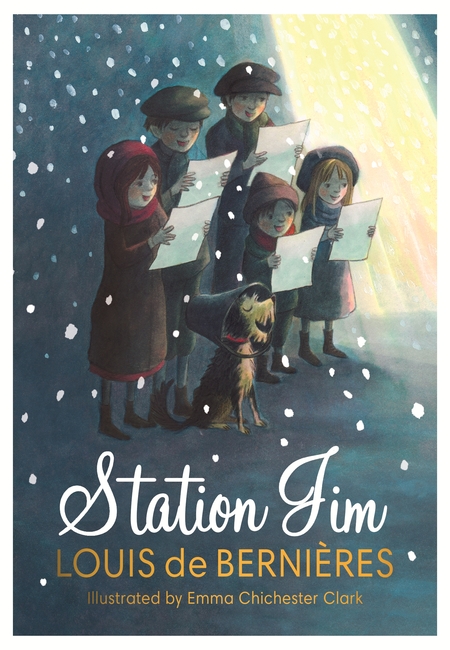One of the things that makes Christmas such an attractive time of the year is the compelling idea that it might be when someone finds their forever home.
Maybe it’s because many people seem happier at this time of year, or the world simply looks more attractive garlanded in lights and suffused with a manufacturer beauty it otherwise lacks or simply that we’re more apt to talk to others when we’re constantly encouraged to think of it as the most wonderful time of the year; whatever’s behind it, Christmas simply feels happier, more open, more possible.
Granted not all of Station Jim by Louis de Bernières, with illustrations by Emma Chichester Clark, falls within this sacred warm and openhearted period, but it very much lives out the idea that we can be alone and unloved one minute, and in the bosom of unconditional love and family the next.
In this wholly delightful read, deputy station master Mr Ginger Leghorn finds an abandoned puppy in one of the train carriages he is charged with checking for left behind objects – this is in the time of steam trains and late-nineteenth century travel – and decides to temporarily take him home until the real owner, presumably a forgetful passenger, can be found.
Of course, you can’t take a cute black-and-tan puppy home, full of life and vigour, and not have him instantly loved by everyone – while his wife and their pet cat Tildo take a while to come around, come around they do – and so while Mr Leghorn initially sticks to the idea of finding the unnamed puppy’s “real” home, the kids have other ideas and by some cutely deceitful means, they engineer it so that Jim, as he’s eventually christened, ends up their pup and their pup alone.
People used to call around on the Leghorns just to see Jim clanging into things with his bucket on his head, and he even made the local paper. There was a lovely photograph in it of the whole family standing proudly behind, with Jim sitting in front, bucket on head. The caption read: ‘Meet Grinner, the Local Dogmop, Master of Comedy. We Love Him, Say Family.’
The chief joy at this point is watching Jim become part of a loving family.
He goes on all day outings with the five Leghorn children – Alfie, Arthur, Beryl, Sissy and Albert – exploring a countryside ripe with intriguing smells and adventure, and he develops some engagingly endearing quirks, such as wearing a bucket on his head, or attacking the mop whenever Mrs Leghorn tries to do her housework. (It is what bonds them in the end, confirming that those who resist the most at first, end up loving the hardest in the end.)
Jim is soon a wholly inviolable part of this family and whether he finds himself stuck in a rabbit hole, prompting a frantic, trauma-filled search by the family, or taking the children to school, or caroling with the family at Christmas (where goose is eventually settled on the meat of choice, though sheep’s tongue is also a possibility), he is loved, he belongs and he is family.
This wholehearted inclusion of the disruptive but loveable pup soon encompasses the whole town where Jim is known and loved and where his occasional disappearances – his love of sausages seems him accidentally go out to sea on a coal ship though his local fame soon means he is safely home again – are a cause of great concern.
Jim, in short, is loved.
He challenges cats and people alike but he is also an invaluable part of Mr Leghorn’s fundraising efforts for his favourite charity, with the appealingly sweet dog able to convince just about every passenger the deputy station master approaches to part with some coins.
I mean how could you resist a face so wholesomely, mischievously adorable?
Short answer, you can’t and the sheer pleasure of Station Jim, is watching person after person fall in love with the diminutive dog and happily surrender their hearts, their money and their devotion.
Crucially in a story about love and belonging, a memorable part of the book takes places at Christmas in a chapter appropriately called “Station Jim’s Christmas” since he is the centre of activity always, where the Leghorn family’s attention turns to creating just the right King George’s pudding (accompanied by Camperdown sauce), the creation of which centres around Advent, and the aforementioned selection of the meaty centrepiece where goose wins over sheep’s tongue, boar’s head or goose, the latter which wins by an unsurprisingly wide margin.
We read about the family’s retrieval of the Christmas decorations stored in an orange box, the collecting of small yew and laurel branches, and ivy strands, from the surrounding wood, and even sprigs of holly covered in bright red berries.
It’s bucolic and lovely, and it’s accompanied by Alfie’s brave retrieval of mistletoe high in a tree, of the tying of gold ribbon bows onto walls and doors, the creation of Christmas cards, the joint product of Albert’s cardboard cutting and Beryl’s talented art and the making of peppermints and sugared almonds to give away as gifts.
The person most pleased about Station Jim’s return was Smiffy. Even he had had his doubts about whether Jim had really gone out to sea, but now he had been vindicated, or, rather, his bloodhound had. Back in his forge, he patted Sniffy on the head, saying ‘Who’s a good boy, then?’, and all his pride in his dog’s infallibility came flooding back.
As an insight into a lovingly gilded late Victorian Christmas, Station Jim is charmingly written, full of an enveloping sense of festive cosiness that sees Mrs Leghorn embroider handkerchiefs for the kids with their names, the sending of many cards (in the hope of getting many back; Mrs Leghorn dreams of a house full of them)and hope by one plucky pup that there’ll be morsels of biscuit to be had.
Jim is, as he is in everything, very much part of the festivities, and as carols like “O Come, All Ye Faithful” and “Silent Night” fill the air, and people actually eat roasted chestnuts, Jim’s first Christmas is a happy family-centred joy, full of Alfie throwing snowballs for Jim to catch, which he does with snout-dusting alacrity, stockings at the end of the bed filled with goodies like Acme whistles and felt glove puppets, and Jim and Tildo having a ball in the discarded wrapping paper.
Rich in detail and alive with the warmth of tradition and family, Station Jim is a gorgeous, heart-stirring reminder of the power of a faithful family pet, and one hilariously quirky and full speed ahead dog to change lives, not simply his own by being lucky enough to be found on the train by someone whose family embraced him immediately and mostly without question, but those of everyone around him, not just at Christmas but right throughout the year which becomes infinitely richer simply because one loveable dog is there and is loved and loves back unreservedly.

